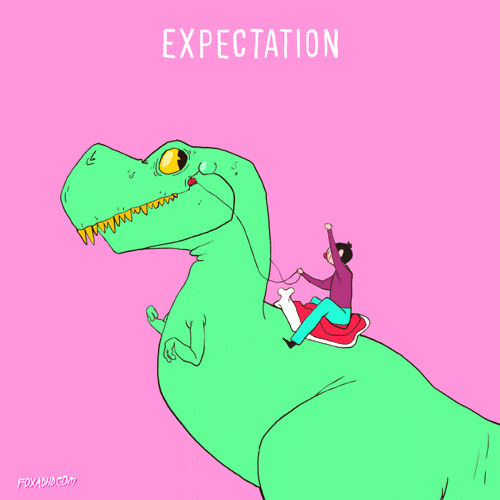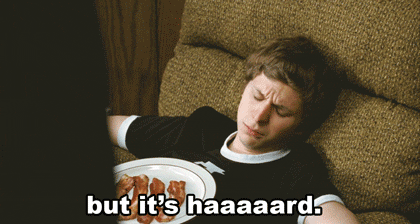#NerdsUnite: How To Stop Having Expectations in Relationships
Talk Nerdy To Me’s @StaffWriter:
I've been in short and long-term relationships over the past 30 years, and I will admit that they weren't always perfect. I've had ups and downs, but over time we learned to compromise and communicate with my partners without letting things escalate into arguments or conflicts that caused us to not talk for days at a time.
Although we managed to maintain our happiness most of the time, there was one problem that repeatedly crept up in several relationships as we grew, matured (or so I thought), and became more comfortable together.
That issue was expectations—specifically, holding our partner to unreasonable expectations.
In this article, I'll share how I learned to stop having these unreasonable expectations in my relationships (and how you can, too).
The Expectation Phase Is Real
Most relationships go through an "expectations phase" where you begin to think about what your partner can do better, how they need to change, and what they should be working on to make things easier or better for you.
This happens a lot when you first start dating someone.
You get to know each other, spend a lot of time together, and generally have a great time while getting familiar with your new partner's habits, behaviors, thoughts, feelings—all the while thinking about how much better your relationship would be if only they could fix this one thing…
Maybe it's something small like where they're leaving their clothes around the apartment—or something bigger like that weird way they chew whenever you go out to eat.
As you learn more about them day after day, you begin comparing them to previous partners and maybe even friends and family.
Once the honeymoon phase ends, those comparisons and nagging issues snowball into frustrations, resentments, and arguments.
Reality Check: You can't realistically expect your partner to act exactly how you want them to. No one is perfect, but the more time you spend together—the more compromises both of you make—the closer you'll be able to come to a mutual agreement (not perfection).
Accepting Reality Is Hard
Once you understand the root of unrealistic expectations, it's time to accept reality.
Unfortunately, this isn't something that happens overnight.
It takes a lot of patience and acceptance on your part (as well as an open mind from your partner) for a relationship to work long term. And there's going to be times where one or both of you have unreasonable expectations of each other.
No matter how bummed or hurt you are, you can't force your partner to change.
The only thing you can do is accept it and move forward. And if this is a recurring pattern in multiple relationships (and not just once in a while), then that should tell you something about yourself.
Specifically: You're probably expecting too much from your partners and the other people around you.
Let Go of Unrealistic Expectations
If we keep wishing our partner would change based on our own personal expectations of them, we'll never be happy with who they really are as individuals—which means we need to let go of those expectations ASAP.
You let go by accepting their imperfections, learning to stop wishing they were different, and loving them for simply being themselves.
Even if there's no pattern of expecting too much from our partners, this is a good time to self-reflect and find out if there's anything we want them to change.
In most cases, it's not the other person who needs to change—it's us.
Focus on the Person We Can Change
We need to stop wishing things were different from how they are and take a hard look at ourselves. In other words, it’s time to fix ourselves before blaming anyone else for our problems or unhappiness.
Here are some questions you can ask yourself when trying to figure out what you're doing that might be causing your expectations in a relationship:
What do I want my partner to change about themselves?
Why do I think I can't be happy with my partner the way they are?
What am I doing to contribute to this problem?
What do I need to change about myself so we can compromise better?
What are my personal expectations of myself and others around me?
How do I measure the greatness of a relationship?
What makes me unhappy in a relationship?
These are all questions you should ask yourself to help find the reasons behind your expectations.
Get on the Same Page with Your Partner
It's easy to criticize our partners when we don't have a clear idea of their wants and needs—and vice versa.
So once you're able to figure out what you're doing that might be causing unrealistic expectations, it's time to sit down with your partner and discuss how both of you can compromise better.
You're now mentally and emotionally prepared for a productive conversation.
Figure Out What You Both Need in Order to Be Happy
The first step is talking about your respective needs, so you know how many compromises need to be made for both of you to be happy. Many times, it's not about one of us "winning" and the other "losing" in a compromise.
There are plenty of times where one partner gives in more than another does, but that doesn't mean it's not an equal amount of give-and-take between both parties.
Until you know what your partner needs to be happy, you can't properly find solutions for making compromises together.
The Art of Compromise is Not Easy, But It's Necessary
Don't expect to always get what you want when compromising with someone else—especially if you're in a long-term relationship that's lasted more than a year.
It's normal to disagree about certain things in our relationships because we're individuals with different likes and dislikes. There will always be disagreements in any relationship, which is why the art of compromise is at the core of every successful union.
What's important to understand, however, is that when either partner feels like something isn't fair in a compromise, it could be due to an unspoken expectation.
It's essential to uncover, express, and negotiate unspoken expectations.
When you're able to find an agreement that makes both partners happy, you'll see your expectations balance. Ironically, the more balanced your mutual expectations, the happier your relationship.
You'll also see more fulfilling relationships with fewer conflicts because there won't be so much defensiveness stemming from unrealistic expectations.
The key here is finding compromises based on each other's reasonable needs instead of trying to get everything your way all the time—because, trust me, you won't.







